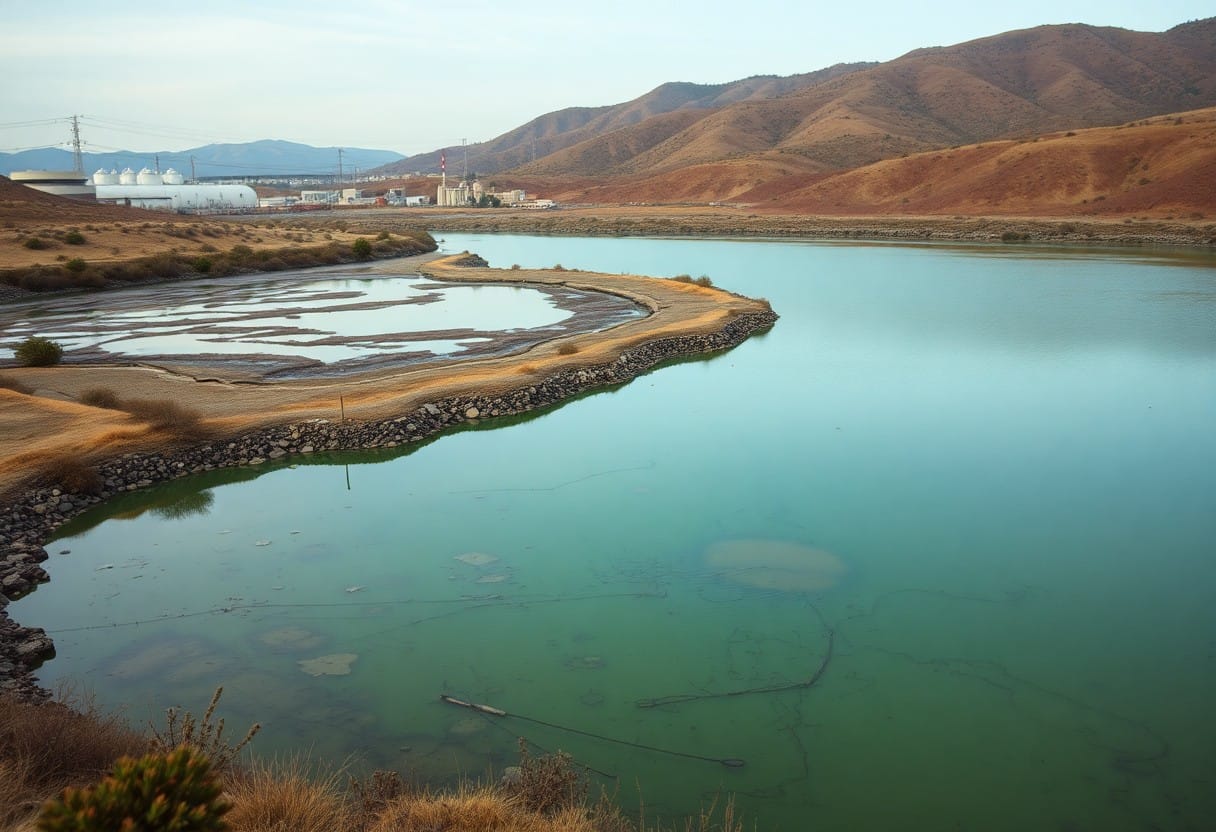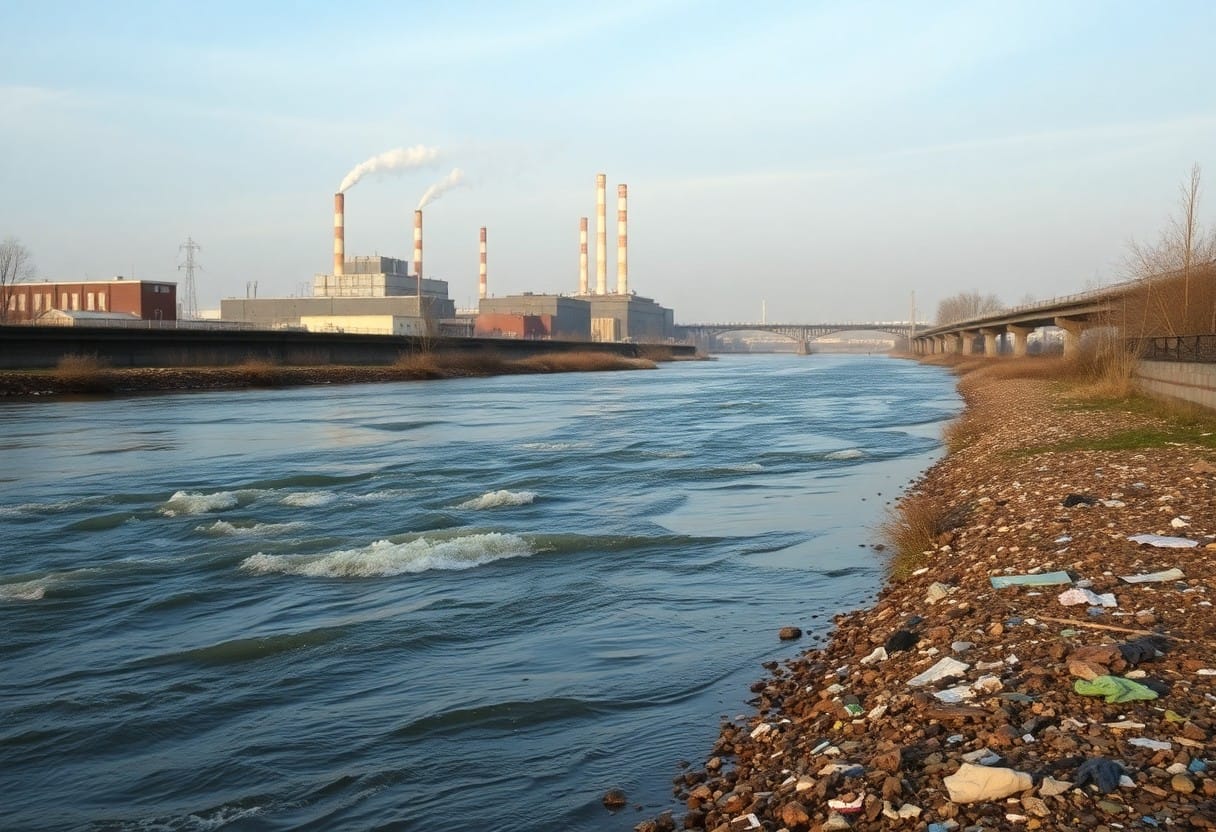Most residents of Fayetteville may not realize that the water you consume every day contains harmful levels of chemical pollutants linked to the Chemours facility. These contaminants, specifically PFAs, pose serious health risks, potentially affecting your well-being and that of your loved ones. As awareness grows, it’s vital for you to stay informed about this critical issue and advocate for clean drinking water in your community. Join us as we explore the implications of this invisible crisis and uncover the steps you can take to protect yourself and your family.
The Impact of Chemours on Fayetteville’s Water Supply
Your understanding of Fayetteville’s water supply is incomplete without recognizing the significant influence of Chemours. This multinational corporation, known for producing chemicals, has operations that directly impact the local environment. Among these operations lies the generation of per- and polyfluoroalkyl substances (PFAS), which, due to their persistence in the environment, pose serious threats to water quality. The company’s facilities have been linked to the contamination of Fayetteville’s drinking water, leading to an urgent need for community awareness and response.
Overview of Chemours Operations
Any overview of Chemours operations reveals a complex interplay between industry practices and ecological impact. Operating several manufacturing plants, Chemours produces a range of products, including fluoropolymer materials. These facilities have raised substantial concerns over their emissions and by-products, particularly in relation to the water systems that supply Fayetteville residents. As a result, the interactions between industrial processes and environmental regulations have become critical to the population’s health and safety.
Historical Contamination Events
Besides the continual risks posed by Chemours, the history of contamination events paints a troubling picture for Fayetteville. Over the years, numerous reports have surfaced regarding the release of hazardous substances into nearby water bodies, leading to drastic increases in toxic levels in drinking water sources. These historical events serve as alarming reminders of the consequences associated with industrial negligence and the long-term implications for public health.
Also, the earlier instances of water contamination have led to a sustained outcry from the community, resulting in several investigations aimed at understanding the extent of pollution and its impact on health. The presence of pollutants like PFOA and PFOS in the water supply has been alarming for residents, with studies linking these chemicals to severe health issues, including cancer and reproductive problems. Awareness and advocacy efforts fueled by these historical contamination events are pivotal as you navigate your concerns about water safety and its implications for your family’s health.

Health Risks Associated with Contaminated Water
There’s a growing concern about the health risks posed by contaminated drinking water in Fayetteville, particularly due to the presence of pollutants associated with Chemours. These contaminants can seep into water supplies and threaten not just your health but also the health of your family and community. As the levels of harmful substances such as per- and polyfluoroalkyl substances (PFAS) increase in the water, you may be exposed to materials linked to various serious health conditions.
Overview of Contaminants
To fully understand the impact of contaminated water, you need to familiarize yourself with the specific contaminants involved. Pollutants like PFAS, which have been utilized in numerous industries for their water- and grease-resistant properties, have made their way into the water supply. These substances do not break down easily in the environment or your body, leading to potential bioaccumulation and long-lasting exposure. Other contaminants may include heavy metals and industrial byproducts, all of which can pose significant health risks when ingested over time.
Long-term Health Effects
For those exposed to contaminated drinking water, the long-term health effects can be severe. Studies have linked PFAS exposure to various health issues such as reduced immune system effectiveness, hormonal disruptions, and an increased risk of kidney and testicular cancers. You should be aware of other potential conditions, such as liver damage and adverse developmental outcomes in children. These effects can manifest over time, often without immediate symptoms, making it all the more critical to monitor your environment and ensure the safety of your drinking water.
The implications of long-term exposure to contaminated water can be profoundly life-altering. Your risk for serious conditions such as endocrine disruption and certain cancers significantly increases as you continue to consume contaminants like PFAS and heavy metals. It is vital to take proactive measures to protect yourself and your loved ones by seeking out clean water sources and advocating for improved safety standards in your local water supply. Stay informed about the quality of your drinking water and consider testing it to safeguard your long-term health.
Community Response and Activism
Assuming you reside in Fayetteville, you might feel a profound sense of unease regarding the current state of your drinking water. This concern has driven many community members to take action against the pollution emanating from the Chemours facility. As a result, a wave of activism has swept through the area, uniting residents, organizations, and advocacy groups in a collective response aimed at securing clean water for everyone. You may become aware of gatherings, forums, and protests as these efforts intensify, with each activity further amplifying the call for accountability and action from local authorities.
Local Organizations and Advocacy
Behind these inspiring movements are local organizations dedicated to advocating for environmental justice and the health of your community. Groups such as the Nature Conservancy and Environment North Carolina are leading the charge, providing invaluable support and resources. They work tirelessly to educate you and your neighbors about the risks associated with contaminated water, while also pushing for stricter regulations on industries like Chemours. Through partnerships with legal advocates, scientists, and community leaders, these organizations aim to create a powerful voice to demand change and ensure that you and your family have access to safe drinking water.
Public Awareness Campaigns
At the forefront of addressing Fayetteville’s ongoing crisis are public awareness campaigns designed to inform you about the specific contaminants found in your water and the potential health implications these may carry. Campaigns utilize various platforms, including social media, community workshops, and informational flyers, ensuring that you are not left in the dark regarding this impending threat. Each effort contributes significantly to raising consciousness about the dangers of pollution from Chemours while fostering a sense of community responsibility. Recognizing the need for collaboration, these campaigns encourage you to play an active role in advocating for reform and demand transparency from the companies affecting your environment.
Hence, these public awareness campaigns have proven imperative in mobilizing your community to support initiatives advocating for clean water. With information dissemination at their core, they equip you with the knowledge necessary to make informed decisions and actively participate in public discussions. Engaging in such campaigns not only fuels your understanding but also builds solidarity among residents, strengthening the movement’s overall impact in holding pollutors accountable and facilitating much-needed change.
Government and Regulatory Actions
After extensive public outcry regarding the contamination of drinking water, government and regulatory bodies have begun to take action aimed at addressing the ongoing crisis in Fayetteville. While initial responses were slow, recent events have spurred state and federal authorities to reevaluate their policies surrounding chemical contaminants like PFAS. For more insights on regulatory gaps, you may want to read about How Deregulation Fuels the Spread of Forever Chemicals.
State and Federal Responses
State efforts have included setting stricter limits for PFAS in drinking water and conducting comprehensive assessments of water quality in affected areas. You may find it concerning that some federal responses have lagged behind, with challenges in establishing nationwide regulations. Despite these hurdles, lawmakers are increasingly recognizing the need for coordinated efforts to protect public health.
Policy Changes and Future Regulations
Before implementing sweeping changes, regulatory bodies must first gather extensive data on the effects of contamination on public health. Ongoing studies aim to provide a clearer picture of the risk posed by harmful chemicals and to drive policy evolution. As you consider the implications of these developments, it’s worth noting that the push for legislative action is becoming stronger.
Regulatory bodies are beginning to prioritize the establishment of clear standards and guidelines to minimize the presence of dangerous chemicals in drinking water. Ongoing dialogues about potential policy changes emphasize the importance of informed decision-making and transparency. You should remain vigilant as these discussions advance, as the adoption of stronger regulations could significantly alter the safety of your water supply in the future. Changes in policy not only reflect a commitment to protect your health but also signal an evolving understanding of the risks associated with chemical contaminants.
Remediation Efforts
Current Cleanup Initiatives
Below are the ongoing cleanup initiatives being implemented in Fayetteville to address the contamination caused by Chemours. Various local and state agencies have come together to initiate robust testing and monitoring programs aimed at assessing the extent of the chemical pollutants. These programs not only evaluate the current water quality but also seek to understand the historical impact of these contaminants. You may be encouraged to see that Chemours has committed to funding some of these efforts, collaborating with environmental groups for a more transparent and effective cleanup strategy.
The state has also imposed strict regulations on Chemours, requiring them to develop and execute a comprehensive remediation plan. This plan includes actions such as water filtration systems in affected areas and the establishment of long-term solutions for safe drinking water access. As a resident, these measures can bring some assurance that efforts are being made to secure your health and safety, but it’s important to stay informed about progress and advocate for consistent updates from your local government.
Challenges in Remediation
Before we can celebrate the efforts to clean up Fayetteville’s water, it’s important to understand the significant challenges those initiatives face. The primary concern lies in the complexity of chemical contaminants involved. Many of these substances are persistent in nature, meaning they can linger in the soil and water systems for extended periods. This leads to complications not just in testing but also in ensuring that all necessary remediation efforts are successful and sustainable.
But the challenges extend beyond the science of remediation. Funding and political willpower play crucial roles in how quickly and effectively cleanup efforts can progress. You might find that while some measures are implemented, bureaucracy can delay the clean-up process significantly. Additionally, community skepticism often arises due to previous mismanagement or misinformation, making it vital for you to stay engaged and push for transparency throughout this critical phase of your community’s public health crisis. Your voice can help hold the responsible parties accountable and ensure your right to clean drinking water is prioritized.
Looking Forward: Solutions and Hope
To navigate the challenges of contaminated drinking water in Fayetteville, it’s vital to focus on actionable solutions and foster a sense of hope among the community. As highlighted by a recent report, the UN panel alleges Chemours is violating human rights of North Carolinians with toxic PFAS, increased awareness and advocacy can propel necessary changes. Local leaders, activists, and concerned citizens are rallying for stricter regulations and accountability from corporations, which could lead to significant improvements in water safety and public health. Your voice matters in this movement; whether through community meetings, petitions, or social media campaigns, every effort can contribute to the greater goal of clean drinking water for all residents.
Technological Innovations
Before moving forward, it’s important to explore the role of technological innovations in addressing water contamination. Advances in filtration systems, such as activated carbon and reverse osmosis, can significantly reduce PFAS levels in drinking water, providing immediate relief to affected communities. Researchers and engineers are also developing cutting-edge materials and processes designed specifically to target and neutralize these harmful chemicals, which could revolutionize the way we approach water purity. By investing in and adopting these technologies, you can play a part in ensuring safer drinking water and protecting your family’s health.
Community Resilience and Striving for Change
Hope lies in the resilience of the Fayetteville community as you rally together to confront this pressing issue. Local organizations are working hard to educate residents on the dangers of contaminated water and the importance of advocating for change. By forming alliances with environmental groups and legal advocates, you can amplify your efforts to hold corporations accountable while ensuring your voice is heard at policy-making levels. Collective action serves as a powerful tool—bringing together diverse perspectives and experiences will strengthen your community’s resolve.
It is not just about fighting the present crisis; it is about fostering a sustainable future. As you unite with like-minded individuals and organizations, you’re not only taking steps to combat current contamination but also working towards long-term solutions that promise safer water for generations to come. Your community’s resilience and commitment to demanding transparency from corporations like Chemours can lead to meaningful change, empowering you and your neighbors to reclaim your right to clean drinking water.
To wrap up
With this in mind, you should be aware of the pressing concerns surrounding the Chemours facility in Fayetteville and its impact on drinking water in your community. The presence of harmful contaminants such as PFAS in your water supply poses significant health risks that cannot be overlooked. It is vital for you to stay informed about local water testing efforts, advocate for clean water initiatives, and support regulations aimed at holding polluters accountable. Your voice in these matters can lead to a greater understanding and potentially foster change that prioritizes public health.
By taking responsibility for your own water quality and engaging with community resources, you can help raise awareness about Fayetteville’s invisible crisis. You have the power to demand transparency from chemical companies and local authorities concerning the safety of your drinking water. With community action and informed dialogue, you can contribute to a collective movement that seeks justice and ensures a healthier environment for both current and future generations.


















